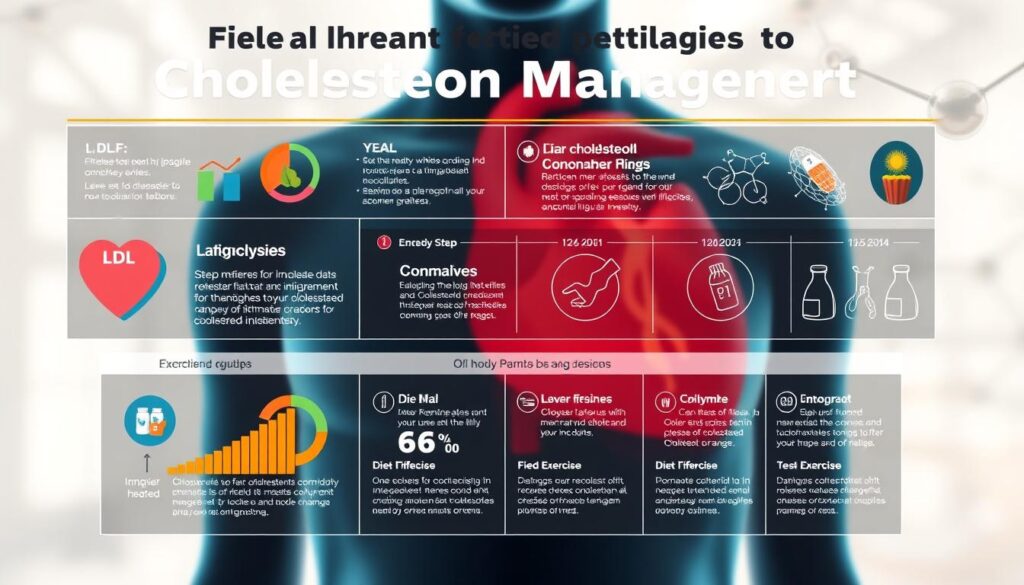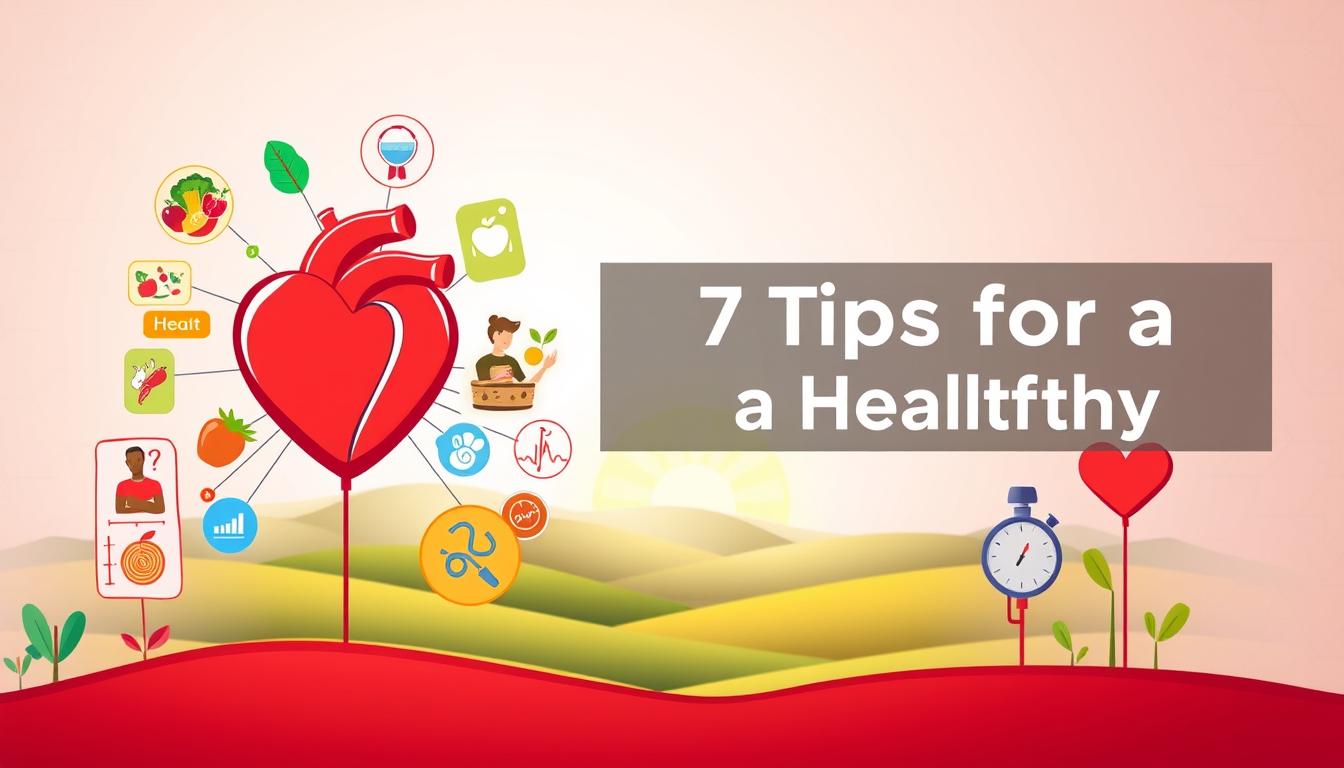How to Prevent Heart Disease : Top 7 Tips for a Healthy Heart
Table of Contents
During a routine checkup, I learned how vital heart health is. The doctor’s words stuck with me: prevention beats cure. Heart disease is the top killer in the U.S., hitting millions of people of all ages and backgrounds.
Your heart health isn’t just about genes. It’s about the choices you make every day. Up to 80 percent of heart disease risk comes from things you can change. This means you have a big say in keeping your heart safe and avoiding future health issues.
Learning about heart disease prevention is more than just medical advice. It’s a personal promise to your health for years to come. By making smart lifestyle changes, you can greatly lower your risk. This leads to better heart health and a healthier life.
Key Takeaways
- Heart disease risk can be significantly reduced through lifestyle choices
- Regular health screenings are critical for early detection
- Physical activity plays a crucial role in heart health
- Diet and nutrition directly impact cardiovascular wellness
- Stress management is essential for heart disease prevention
Understanding Heart Disease and Cardiovascular Health
Heart disease is the top killer in the United States, hitting millions each year. It’s vital to know the many risk factors that lead to heart problems. Your heart’s health is tied to several factors that can either help or harm it.
Critical Risk Factors for Heart Disease
Several factors can raise your risk of heart disease. Key ones include:
- High blood pressure
- Elevated cholesterol levels
- Arterial plaque buildup
- Smoking
- Obesity
- Diabetes
- Physical inactivity
Impact on Overall Health
Heart diseases can really mess up your body’s balance. It’s key to prevent strokes because these diseases can cause serious complications. This includes heart attacks, reduced blood flow, and even life-threatening emergencies.
| Risk Factor | Prevalence in U.S. | Potential Impact |
|---|---|---|
| High Blood Pressure | 45% of adults | Increased heart attack risk |
| High Cholesterol | 38% of adults | Arterial plaque formation |
| Diabetes | 10.5% of population | Cardiovascular complications |
Prevention and Statistics
About 47% of Americans face at least one heart disease risk factor. In 2022, heart disease took 702,880 lives, or one in five deaths. Knowing these numbers shows how crucial it is to take care of your heart and make lifestyle changes.
The Role of Healthy Eating in Heart Disease Prevention
Your diet is key in managing cholesterol and preventing heart disease. Knowing how food affects your heart health helps you make better choices. These choices support your heart’s well-being over time.
A heart-healthy diet includes foods that fight heart disease risks. It’s about picking foods that boost good cholesterol and cut down on bad fats.
- Choose whole grains over processed carbohydrates
- Incorporate lean proteins like fish and legumes
- Select fruits and vegetables rich in antioxidants
- Use liquid vegetable oils for cooking
- Limit sodium and added sugar consumption
Good nutrition is a big step in preventing heart disease. Studies show that changing your diet can lower heart disease risks. It helps keep your blood pressure, cholesterol, and blood sugar in check.
| Food Category | Heart-Health Impact | Recommended Servings |
|---|---|---|
| Fruits/Vegetables | Reduces inflammation | 5-9 servings daily |
| Whole Grains | Lowers cholesterol | 3-5 servings daily |
| Fatty Fish | Provides omega-3 fatty acids | 2-3 servings weekly |
Preventing heart disease through diet takes ongoing effort. Even small, steady changes can lead to big health gains for your heart.
To get better results, you can benefit from the benefits of this nutritional supplement
Essential Blood Pressure Management Strategies
Keeping your blood pressure in check is vital for heart health. Learning how to manage it can lower your risk of heart disease and other serious health issues.
Your blood pressure is a key sign of heart health. High blood pressure is often silent, earning it the nickname “silent killer”. It’s important to check it regularly for early detection and prevention.
Recommended Blood Pressure Ranges
Doctors define blood pressure ranges as follows:
| Category | Systolic (mmHg) | Diastolic (mmHg) |
|---|---|---|
| Normal | Less than 120 | Less than 80 |
| Elevated | 120-129 | Less than 80 |
| Hypertension Stage 1 | 130-139 | 80-89 |
| Hypertension Stage 2 | 140 or higher | 90 or higher |
Lifestyle Modifications for Blood Pressure Control
Improving cardiovascular health requires lifestyle changes:
- Eat a healthy diet full of fruits and vegetables
- Keep sodium intake under 2,300 mg daily
- Stay active with regular exercise
- Use stress-reducing techniques
- Keep a healthy weight
Monitoring and Testing Frequency
How often you should check your blood pressure depends on your risk factors:
- Healthy adults: Every 2 years
- Adults with risk factors: Annually or as advised by a doctor
- People with high blood pressure: Monthly or as directed
Proactive blood pressure management can prevent serious health risks and improve your quality of life.
Cholesterol Management and Heart Health

Knowing how to manage cholesterol is vital for heart health. Cholesterol helps build cells and make hormones. But, keeping the right amount is crucial to avoid plaque buildup in arteries.
There are different types of cholesterol, each with its own role in health:
- LDL (Low-Density Lipoprotein): Often called bad cholesterol, it can contribute to arterial plaque formation
- HDL (High-Density Lipoprotein): Known as good cholesterol, helps remove excess cholesterol from your bloodstream
- Triglycerides: Another type of fat that can impact cardiovascular health
Your liver makes most of your cholesterol naturally. But, what you eat also affects your levels. About 25 percent of cholesterol comes from food, especially animal products.
“Know your numbers: Regular cholesterol screenings are your first line of defense in heart health.” – American Heart Association
To manage cholesterol levels, try these tips:
- Eat a heart-healthy diet rich in fruits, vegetables, and whole grains
- Limit saturated and trans fats
- Exercise regularly to improve cholesterol profiles
- Maintain a healthy body weight
- Consider cholesterol-lowering medications if recommended by your healthcare provider
It’s important to get regular check-ups. High cholesterol often has no symptoms. Doctors suggest getting cholesterol screenings every five years for adults over 20.
Physical Activity Guidelines for Cardiovascular Wellness
Physical activity is a strong ally for your heart health. By choosing the right exercises, you can lower heart disease risks and boost your overall health.
Regular exercise is a game-changer for your heart. Studies show active people have lower death rates and better health than those who don’t move much.
Types of Heart-Healthy Exercises
- Aerobic Activities: Walking, swimming, cycling
- Strength Training: Weight lifting, resistance band exercises
- Flexibility Exercises: Yoga, stretching routines
Weekly Exercise Recommendations
The American Heart Association suggests these lifestyle changes for heart health:
- 150 minutes of moderate-intensity aerobic activity per week
- 75 minutes of vigorous-intensity aerobic activity per week
- Strength training activities at least twice weekly
Benefits of Regular Physical Activity
Regular exercise brings many heart health benefits, including:
- Lower blood pressure
- Improved cholesterol levels
- Enhanced blood circulation
- Stress reduction
- Weight management
Just 30 minutes of daily activity can cut your heart disease risk. Start small, stay consistent, and see your heart health soar.
Maintaining a Healthy Weight for Your Heart

Your weight is very important for your heart health. Keeping a healthy body mass index (BMI) is crucial. Too much weight, especially around the waist, can harm your heart.
Knowing your body composition is key to making good lifestyle choices. Here are some important tips for managing your weight:
- Healthy waist measurements:
- Men: Under 37 inches (94 cm)
- Women: Under 31.5 inches (80 cm)
- Recommended daily physical activity: 30 minutes
- Target weekly physical activity: 150 minutes
Here are some effective ways to manage your weight:
- Eat a balanced diet with whole foods
- Stay active with regular exercise
- Control your food portions
- Reduce your intake of processed foods
| Weight Management Factor | Impact on Heart Health |
|---|---|
| BMI Under 25 | Reduced Heart Disease Risk |
| Regular Exercise | Improved Cardiovascular Function |
| Healthy Diet | Lower Cholesterol Levels |
Remember, lasting lifestyle changes are more important than quick fixes. Always talk to healthcare experts for advice on managing your weight for your heart health.
Stress Management and Heart Disease Prevention
Keeping your heart healthy is more than just eating right and exercising. Stress is a big player in heart disease, making it key to manage stress for a healthy heart.
Long-term stress can harm your heart by causing damage to blood vessels. It also raises your blood pressure and heart rate. These changes can lead to serious heart problems over time.
Understanding Stress Impact on Heart Health
- Chronic stress weakens the immune system
- Increases risk of coronary artery disease
- Raises blood pressure and heart rate
- Contributes to inflammation in the body
Effective Stress Reduction Techniques
Using the right stress management can protect your heart and boost your mood. Here are some effective ways to cut down stress:
- Deep Breathing Exercises: Practice 3-5 breathing cycles to lower blood pressure
- Regular Physical Activity: Release stress-fighting endorphins
- Meditation and Yoga: Lower stress hormones
- Positive Reflection: Focus on daily gratitude
| Stress Reduction Method | Cardiovascular Benefits | Recommended Frequency |
|---|---|---|
| Deep Breathing | Stabilizes Blood Pressure | 3-5 cycles, 2-3 times daily |
| Exercise | Reduces Stress Hormones | 30 minutes, 5 times weekly |
| Meditation | Lowers Inflammatory Markers | 15-20 minutes daily |
By focusing on stress management, you can lower your heart disease risk and live better. Remember, your mental health is closely tied to your heart health.
The Connection Between Diet and Heart Health

Your diet is key to keeping your heart healthy and preventing heart diseases. Eating the right foods can help manage cholesterol and prevent plaque buildup. The foods you eat directly affect your heart’s health, making diet a strong tool for heart protection.
For a heart-healthy diet, focus on making smart food choices. Here are some tips:
- Prioritize fruits and vegetables rich in antioxidants
- Select whole grains over processed carbohydrates
- Choose lean proteins like fish and poultry
- Incorporate healthy fats from nuts and olive oil
Research shows certain foods are better for your heart. The American Heart Association advises:
- Limit added sugar to 100 calories for women and 150 calories for men daily
- Eat 5-8 ounces of whole grains and two servings of low-mercury fish weekly
Managing sodium is also important for heart health. Experts say to limit sodium to 2,300 milligrams a day, aiming for 1,500 mg for most adults. Foods with over 300 mg of sodium per serving can harm your heart-healthy diet.
By choosing the right foods, you can prevent cholesterol buildup and reduce plaque. Adding foods like berries, citrus fruits, and fiber-rich options can lower bad cholesterol. This supports your heart’s overall health.
Lifestyle Modifications to Prevent Heart Disease
Keeping your heart healthy means making smart lifestyle choices. These choices can greatly lower your risk of heart disease. Every decision you make affects your heart’s health, from daily routines to long-term plans.
Smoking Cessation Benefits
Smoking greatly ups your heart disease risk. Studies show smokers are twice as likely to face heart problems than non-smokers. Quitting smoking brings quick and lasting heart health benefits.
- Reduces heart disease risk within one year of quitting
- Improves blood circulation
- Decreases risk of stroke
- Lowers blood pressure
Alcohol Consumption Guidelines
Drinking alcohol in moderation has a complex role in heart health. Experts suggest women limit their intake to one drink a day. Men should stick to two drinks daily to avoid risks.
“Moderation is key in maintaining heart wellness through alcohol consumption.”
Sleep Quality and Heart Health
Good sleep is vital for heart health. Adults need 7-9 hours of sleep each night. Not getting enough sleep can lead to obesity and heart disease risks.
- Maintain consistent sleep schedule
- Create a relaxing bedtime routine
- Avoid electronic devices before sleeping
- Manage stress through relaxation techniques
By making these lifestyle changes, you can help keep your heart healthy and lower risk factors.
Conclusion
Preventing heart disease is a journey that needs commitment and smart lifestyle changes. With heart health being more important than ever, what you do now can greatly affect your future. Knowing that 6 in 10 U.S. adults could face heart disease in 30 years shows how crucial it is to act early.
Managing heart disease risk requires a full approach. Regular exercise, healthy eating, managing stress, and checking your health often are key. By doing at least 2.5 hours of moderate exercise a week and eating right, you can lower your heart disease risk a lot.
Your choices have a big impact. Quitting smoking, controlling blood pressure, and keeping a healthy weight are great for your heart. With more heart disease cases expected, it’s time for us to take action together. Prevention is not just about avoiding sickness; it’s about living a full, healthy life.
Begin your heart health journey today. Work with doctors, get your family involved in healthy habits, and stick to making smart choices. Your heart is worth your best effort to stay healthy for years to come.
FAQ
What is heart disease, and why is prevention so important?
Heart disease is a serious condition that affects your heart and blood vessels. It can lead to heart attacks and strokes. Up to 80% of heart disease cases can be prevented by making healthy lifestyle choices.
How does diet impact heart health?
Your diet is very important for your heart. Eating foods like fruits, vegetables, and lean proteins can help keep your heart healthy. Try to eat foods rich in omega-3s and avoid too much saturated fat.
What are the primary risk factors for heart disease?
High blood pressure, high cholesterol, and obesity are big risks. Smoking, not being active, diabetes, and stress also play a part. Knowing these risks can help you take steps to protect your heart.
How much exercise do I need to protect my heart?
You should aim for 150 minutes of moderate exercise or 75 minutes of vigorous exercise each week. Activities like walking, swimming, or cycling are great. Even a little more exercise can help your heart.
Can stress really affect my heart health?
Yes, stress can harm your heart. It can raise your blood pressure and lead to unhealthy habits. Finding ways to manage stress, like through meditation or exercise, is important.
How important is maintaining a healthy weight for heart health?
Keeping a healthy weight is key for your heart. Excess weight can lead to high blood pressure and diabetes. Losing a little weight can make a big difference in your heart health.
Are there specific diets recommended for heart health?
Yes, the Mediterranean and DASH diets are good for your heart. They focus on whole foods, lean proteins, and healthy fats. They also limit processed foods and added sugars.
How often should I get my heart health checked?
You should get your heart health checked regularly. Adults should have their blood pressure checked every year. Cholesterol levels and a full heart health check should be done every few years.
Can I reverse heart disease through lifestyle changes?
While you can’t undo all heart damage, lifestyle changes can help a lot. Healthy habits can slow down heart disease and even reverse some damage. Keeping up with these habits is crucial.
What role does sleep play in heart health?
Good sleep is vital for your heart. Poor sleep can increase inflammation and blood pressure. Aim for 7-9 hours of sleep each night and try to keep a regular sleep schedule.







